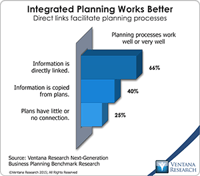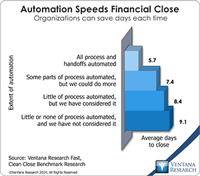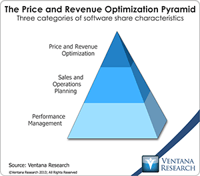Ventana Research recently awarded Workday a 2016 Technology Innovation Award for its newly released application, Workday Planning, because it simplifies and streamlines the budgeting and planning processes while facilitating collaboration, deepening visibility into spending and enabling tight fiscal control. These capabilities can help a variety of user organizations in several ways.
Read More
Topics:
Big Data,
Marketing,
Office of Finance,
Budgeting,
Controller,
In-memory,
CFO,
Workday,
demand management,
Financial Performance Management,
financial reporting,
FPM,
Integrated Business Planning
Ventana Research recently released the results of our Next-Generation Business Planning benchmark research. Business planning encompasses all of the forward-looking activities in which companies routinely engage. The research examined 11 of the most common types of enterprise planning: capital, demand, marketing, project, sales and operations, strategic, supply chain and workforce planning, as well as sales forecasting and corporate and IT budgeting. We also aggregated the results to draw...
Read More
Topics:
Big Data,
Planning,
Predictive Analytics,
Sales,
Sales Performance,
Social Media,
Supply Chain Performance,
Human Capital Management,
Marketing,
Office of Finance,
Reporting,
Budgeting,
Controller,
Customer Performance,
Operational Performance,
Business Analytics,
Business Performance,
Cloud Computing,
Financial Performance,
In-memory,
Workforce Performance,
CFO,
Supply Chain,
capital spending,
demand management,
Financial Performance Management,
financial reporting,
FPM,
Integrated Business Planning,
S&OP
A core objective of my research practice and agenda is to help the Office of Finance improve its performance by better utilizing information technology. As we kick off 2014, I see five initiatives that CFOs and controllers should adopt to improve their execution of core finance functions and free up time to concentrate on increasing their department’s strategic value. Finance organizations – especially those that need to improve performance – usually find it difficult to find the resources to...
Read More
Topics:
Big Data,
Performance Management,
Planning,
Predictive Analytics,
Sales Performance,
Supply Chain Performance,
Office of Finance,
Budgeting,
close,
dashboard,
PRO,
Tax,
Analytics,
Business Analytics,
Business Collaboration,
Business Performance,
CIO,
Customer & Contact Center,
Financial Performance,
In-memory,
CFO,
Supply Chain,
CEO,
demand management,
Financial Performance Management,
FPM,
S&OP
People who don’t spend much time analyzing the software market may have trouble understanding the differences between products in a given software category or the difference between two categories. This happens because vendors and commentators use the same words to describe different depths of functionality and degrees of comprehensiveness in one type of application. As well, there can be multiple categories of software that address the same general business issues but are designed for...
Read More
Topics:
Performance Management,
Sales Performance,
Supply Chain Performance,
Office of Finance,
dashboard,
PRO,
Operational Performance,
Business Analytics,
Business Performance,
Financial Performance,
CFO,
Supply Chain,
CEO,
demand management,
FPM,
S&OP
I recently attended Kinaxis’ users’ group meeting and learned some interesting things. The company, which has been around since 1995, provides software for large corporations with complex supply chains. Over the past decade its product has evolved well past its roots as a material requirements planning (MRP) support tool. It is now an analytics suite that facilitates supply and demand planning, analysis and optimization with a focus on sales and operations planning (S&OP). This is a discipline...
Read More
Topics:
Planning,
Sales,
Sales Performance,
Supply Chain Performance,
Office of Finance,
Budgeting,
Kinaxis,
Operational Performance,
Business Analytics,
Business Collaboration,
Business Performance,
Cloud Computing,
Financial Performance,
Supply Chain,
demand management,
Integrated Business Planning,
S&OP













